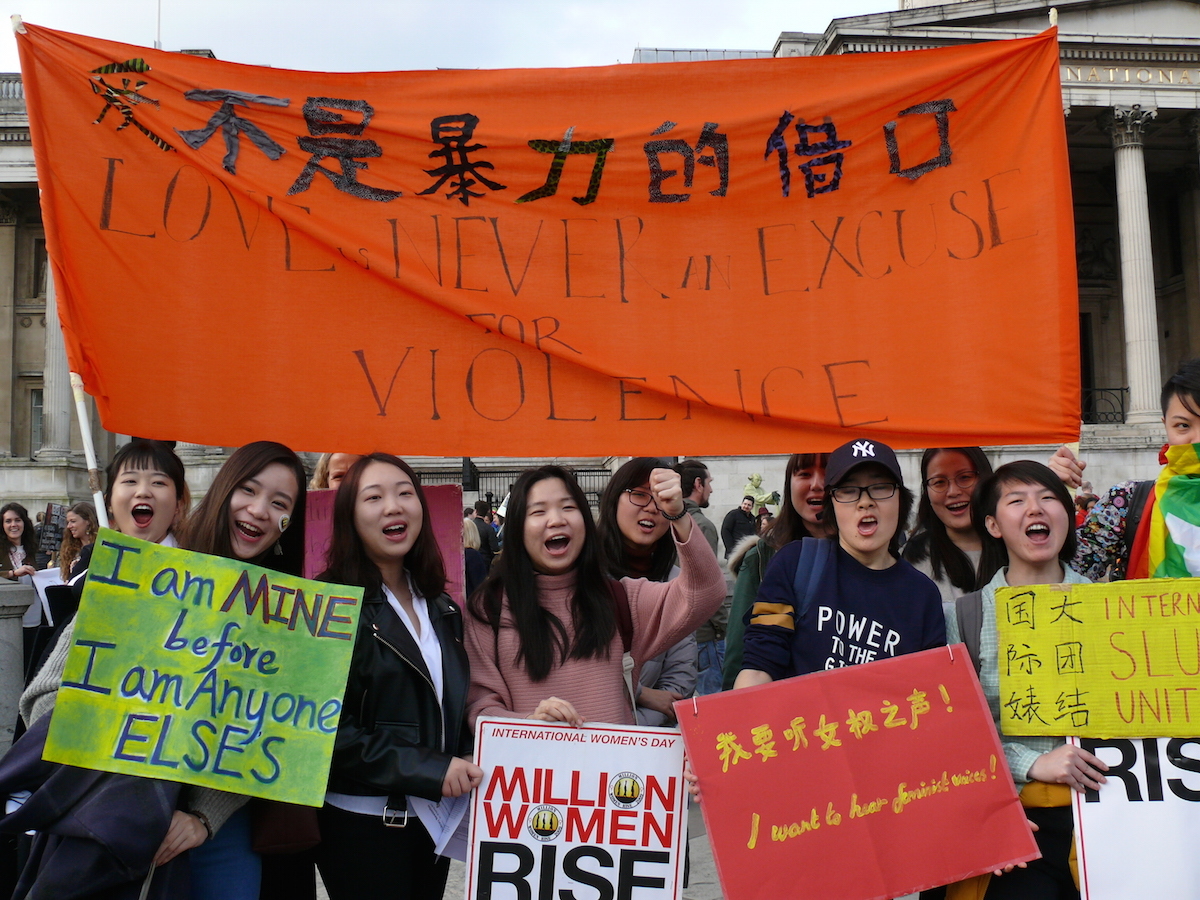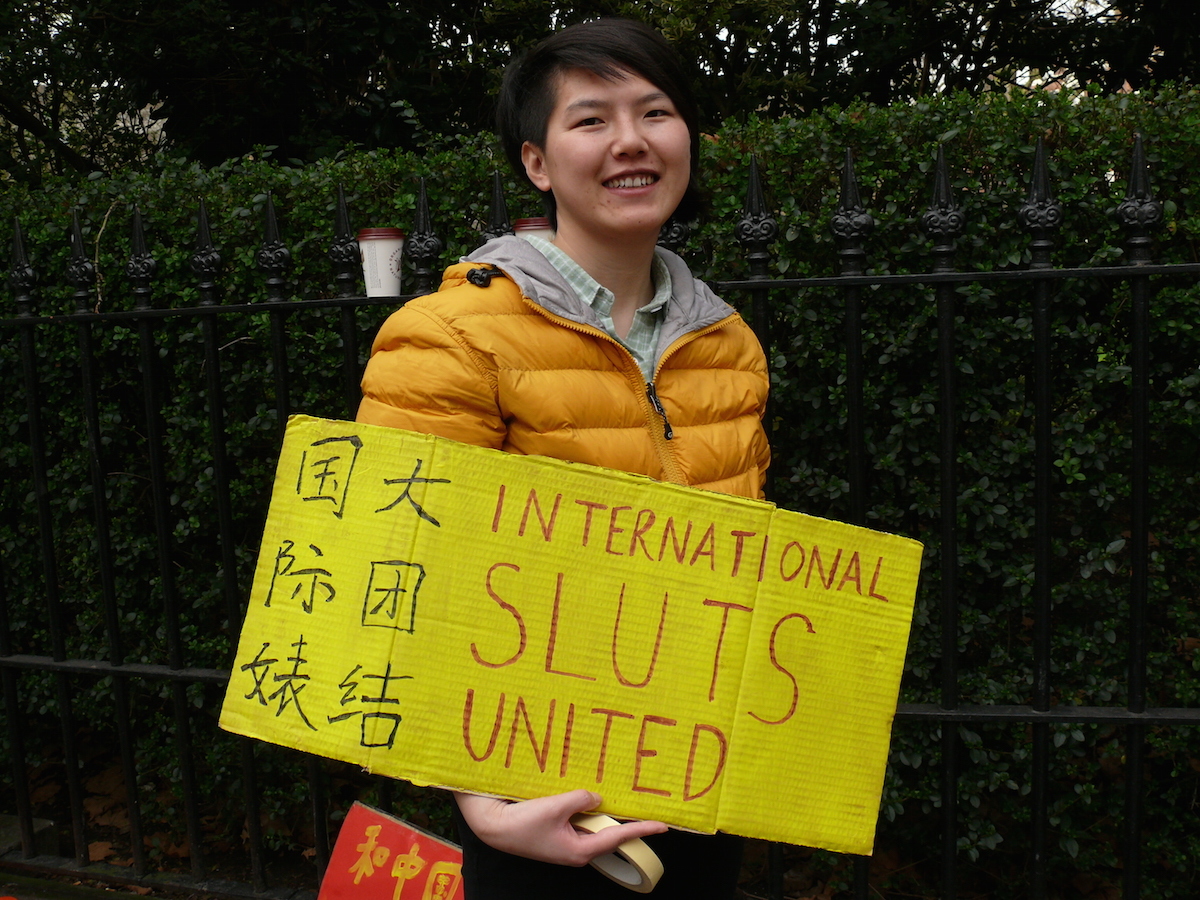At the Million Women Rise demonstration in London, where thousands of protesters gathered in March to call for an end to gender-based violence, a visiting activist has come to take part with friends and allies: the Chinese feminist Li Maizi.
At midday, about 15 London-based Chinese students, activists, artists and allies meet near Selfridge’s, carrying hand-painted placards and hand-stitched banners reading “International Sluts United” and “I want to hear Feminist Voices.”
Videos by VICE
On her first visit to the UK from Beijing, Li has given talks at three British universities to draw attention to the state of feminist and queer activism in China today, as one of its most prominent faces internationally.
As part of the Feminist Five, Li along with Wang Man, Wei Tingting, Wu Rongrong and Zheng Churan were detained for 37 days in 2015, after planning to distribute anti-sexual harassment stickers on the public transport systems in Beijing, Guangzhou and Hangzhou on International Women’s Day. (The event coincided with two major government conferences, which often involve stricter restrictions on public dissent.)
Li was 25 years old at the time of her detention, which involved 50 instances of interrogation and her parents being moved to her aunt’s house for 10 days, leaving their dog at home alone. Banding together, Li’s friends gave her parents money and emotional support.
Read more: Where 30 Million ‘Missing’ Girls in China Actually Went
“When I got released, I feel very angry about that—what they do to my parents,” she says.
“It took a long time to make them to support my work,” she says of her parents, both former farmers who went on to work in a food factory. (Her father is now unemployed.)

Li Maizi (right) with other Chinese protesters at the Million Women Rise march. All photos by Tamara Micner
Sporting a short asymmetrical haircut and undercut, Li is both joyful and serious about her activism. She leads chants along the march, despite having a cough from the pollen in the air (though Beijing’s air pollution doesn’t affect her), and gladly shouts into a microphone in Mandarin and English when offered it by volunteer stewards. She is highly active on social media, using WiFi and friends’ mobile hotspots while abroad, and likes to pose as Rosie the Riveter in photos. At last year’s Gay Pride parade in New York, she went topless.
During her detention, the international campaign that drew support from activists from the US to UK to South Korea showed Li the importance of solidarity—which she in turn has shown, most recently, toward Irish activists campaigning for abortion rights. (Pro-choice campaigners there recently went on strike, inspired by women in Poland.)
“Even though we’re based in different contexts, we still can keep in solidarity,” she says.
For Li, gender-based violence, reproductive rights and anti-slut shaming are key feminist issues around the world, despite the different national contexts. Identifying as a lesbian and “international slut,” Li ties anti-slut shaming to gender-based violence, which she calls “a severe problem” in China.
‘You are sluts. The reason you got raped is because of your dress.’ Bullshit.
“We need to uncover it,” she says. “We can’t reveal those stories [of violence] because of the slut-shaming. It’s very severe, everywhere. ‘You are sluts. The reason you got raped is because of your dress.’ Bullshit.”
So last year, when the Stanford rape survivor went public with her court testimony, Li expressed solidarity with US survivors.
“They can speak, make an outcry, but we can’t,” she says.
In China, she says, “People prefer to hide their stories, and heal themselves alone.” She thinks it’s slowly becoming safer for survivors to share their stories, however.

Li Maizi identifies as a lesbian and an “international slut.”
Li also notes that it’s safer for Chinese activists to criticize other countries’ policies than their own. Similarly, the Chinese government has criticized gender-based violence in India (including the New Delhi gang rape of 2012) though a similar situation exists in China.
“In India, there’s a lot of women that tell their stories to the public, but in China, you can’t say it,” she says.
As for abortion, China has its own set of restrictions. Though it’s available well into pregnancy, it’s encouraged for unmarried women (who can’t obtain official household registration for kids born out of wedlock) and, given the country’s two-child policy, required for married women who already have two children.
Li became an activist in 2012, while studying public administration at Chang’an University in Xi’an. Her notable actions include occupying a men’s toilet at university, and the “Blood Brides” protest in 2012. Inspired by feminists in Turkey, she and two other young women donned red-stained wedding gowns and marched along Qianmen Street (near Tiananmen Square) for 20 minutes to draw attention to domestic abuse, holding signs that read “Love is not an excuse for violence.”
Watch: Inside China’s Last Matriarchy
After her release in 2015, she considered quitting activism, but decided to continue, something she calls “a tough decision.”
“I have no choice,” she says. “If you’re just doing nothing, you feel very powerless.”
As a young gay woman who has been detained and doesn’t want to work in the private sector, she along with many others in her community are figuring out how to support themselves as activists.
“It’s a real problem,” she says. “There’s a lot of principles about how to be a feminist and how to practice feminism in your own life, but there’s another question: how to make a life. So I have to think about it.”
At the four-hour march—which winds through both Chinatown and Soho (the heart of London’s queer scene)—the group chants in Mandarin and English, drawing surprised looks from surrounding protesters and Chinese-speakers walking nearby. Amid chants for safe streets and an end to gender-based violence, Li and co. shout, “Solidarity, power,” “Chinese sluts!” and “Women of China: power, power, power!”
For More Stories Like This, Sign Up for Our Newsletter
Li’s visit to England was all the more timely after the Chinese government suspended the alternative media site Feminist Voices, which has 100,000 followers on Weibo (a microblogging site likened to Twitter). It has been shut down for almost a month, and Li expects the account will be reopened after the government’s annual congress ends this week.
She says that, since her detention in 2015, one sign of progress is that women have been building communities on Weibo and becoming more aware that gender-based discrimination and violence are wrong.
Though an anti-domestic violence law came into effect in China last year, after a 20-year push led by the All-China Women’s Federation, reports of violence are very low. Li notes that it remains to be seen how well the law will be implemented.
Building on her first visit to the UK, she hopes to return next year to help mount an exhibit of contemporary feminist art in China. She is working with Jiemei (Mandarin for “sisters”), a new UK-based collective of feminist activists, artists and academics, to make it happen.
As the march reaches Trafalgar Square and winds down, the group sits down for the first time that afternoon, snacking and smoking and taking photos. In her last act of organizing for the day, Li ensures they make a dinner reservation for the evening—for hot pot.




